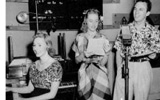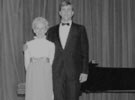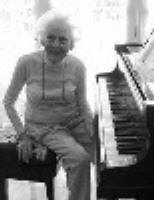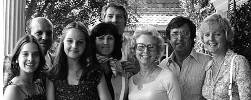Music and Texts of GARY BACHLUND
Vocal Music | Piano | Organ | Chamber Music | Orchestral | Articles and Commentary | Poems and Stories | Miscellany | FAQs
An Appreciation - Dorothy Fries
1915-2011
Tribute to a Master Teacher and Friend

Dorothy Fries
Of all the teachers with whom I have studied over the years, by far the most influential has been Dorothy Fries. When I mention teachers, I include both voice teachers and coaches, as well as many members of the faculties of both Immaculate Heart College, the University of California, Los Angeles, and others with whom I have studied. Mrs. Fries -- as I have always called her out of sincere respect even though she asked me sometimes to call her simply Dorothy later in our relationship -- had a most interesting life, though she ailed with senility in her very last years. She passed away in September 2011, well into her nineties.
A Life of Music and Music
She was born Dorothy Anderson (her father a Mid-West banker and her mother a social activist of that time active in the W. C. T. U.), and came to southern California as a young woman. She wrote of her own education, "I was saturated in the arts of piano, violin and viola, attended school with clocklike precision and lived it all." In fact, she also had studied organ with Norman Soreng Wright who at the time served Hollywood Methodist Church. Mrs. Fries recalled, "Dating from the age of seventeen I began to work continuously and professionally in some branch of the performing arts; this state of affairs persisted until about 1957, when I virtually retired from more active public life, resumed the unfinished business of my formal academic training...."
Before that retirement which was in reality no retirement after all, she had an adventure-filled life. In 1949 a Los Angeles-based radio show was created by Ann Davis and then Dorothy Novis, taking her first husband's name, at KNBH (KNBC) which became syndicated through 1951. The shows were available in 15 and 30 minute episodes, but regardless of the length, "The Adventures of Cyclone Malone" was said in the marketing of that time to have "packed enough puppet-powered action to keep young viewers glued to their sofas, anxiously awaiting the next thrilling installment."
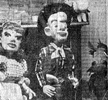

They were nominated for Emmy, for between them they created sixty-five episodes in all, writing the stories, dialogue, song lyrics and melodies, as well as performed the characters each week. In addition to that grueling few years at NBC, she taught voice, piano and organ privately, and worked as voice and dialogue coach and accompanist for the Walt Disney Studios, including The Song of the South and Disney's highly popular television series. Additionally she played in churches and synagogues in southern California.
With Ann Davis and Ross Jones, NBC Radio, 1949
Returning to finish a degree at UCLA, she joined the faculty of Immaculate Heart College in Los Angeles, where I met her in my second year there. For almost fifteen years though not consistently I studied with her while pursuing a wide range of my own interests at that time. Lessons were formal at the beginning, and became broad ranging as I expressed greater interest in both singing, as well as composition and theory. Her prodigious musical skills allowed her to transpose songs at will. For those who can appreciate this, she sight read and transposed Strauß' Cäcelie and Ständchen as well as Mussorgsky's Songs and Dances of Death; this alone should give some indication of her talents.
Undergraduate recital at Immaculate Heart College, 1969
As she had known and worked with my father from his time serving the Southern California Council of Churches' Music Department and Temple Musicians' Guild, she took an interest in my for that personal connection. She was more than generous of her time, and gave extensive lessons, not only in voice but other aspects of music as well. Because of my interest, she allowed me to read through an enormous amount of repertoire including lieder, oratorio and opera. With her, I prepared Schubert's major song cycles, as well as those of Schuman, Mahler, Dvorak, Rachmaninoff, Stravinsky, Respighi, Vaughan Williams, Britten and Rorem. Among my many happy memories of her were the afternoons, when we would sit at her Blüthner grand piano and regularly read piano-four hands from the Marcel Dupré organ editions of Bach and some of the organ works of Liszt, pausing to discuss forms and contrapuntal writing.
Dorothy Fries at her Blüthner, 2004
Alongside her kind and thoughtful instruction, she with her family became friend to me as well. Her second husband, David Fries, would often sit with me over a game of chess and discuss many topics of interest to us both. I set three of his unpublished poems to music, after his death, as a token of my respect and affection for this lovely family. (That short cycle is titled, This Perfect World.)
A True Master Teacher
Her youngest daughter, Catherine Fries-Vaughan, asked me to serve as her godfather, which has been a both a privilege and joy to me; Catherine has become a fine musical theater performer in her own right, and now mother as well. The public at large would know Dorothy Fries perhaps as grandmother to actress Helen Hunt, but of course my perspective is broader by far, knowing her to have been a true master teacher among the many fine teachers and coaches with whom I have studied. Mrs. Fries and I taught together for a while in a dynamic youth program run by the American Center for Musical Theater, which was at that time sponsored by the LA Civic Light Opera and resident at the Dorothy Chandler Pavilion of the Los Angeles Music Center, where now LA Opera makes its home.
In her last years when she could still live alone in Toluca Lake, I visited with her frequently. She still wrote melodies and taught well into her later years, and among the melodies she sometimes improvised, she had sketched a lead sheet for one which I asked her to play as I recorded it. Transcribing it and then placing it into an arrangement, I brought it to her as one gift among many over the years this Variations for Piano and Orchestra on a Theme of Dorothy Fries.
[Left to right: Catherine Fries-Vaughan, David Fries, Helen Hunt, Mae Lisa Novis, Jimmy Novis, Dorothy Fries, Gordon Hunt, and Jane Hunt.]
On the Teacher's Responsibility
Mrs. Fries wrote, "...I should like to expound briefly, but with great earnestness and sobriety on what I consider to be the teacher's responsibility. May I quote a sentence from Robert Kirsch in a recent Los Angeles Times book review? '...the personality of a great teacher is of profound importance: inspiration, risk, the capacity to improvise, the sense of timing, knowing when to demand and when to pull back.'
"Yes, facts will be forgotten; ideas remembered. Personalities fade; principles remain. We must retain sufficient objectivity to see that paradoxically one is very large yet quite small in the lives of students; that is, eventually we must come to the realization of how impossible and undesirable it is to cram every bit of knowledge we possess into the already-spinning heads of our captive audiences. Each of us is a link in a longer chain, importantly establishing continuity from the past and a bridge into the future. However, we deceive ourselves and them if we cannot concede the fact that other books will be read, different and perhaps conflicting concepts entertained by the students after they have left our supervision. This is not to minimize the importance of our respective contributions, but rather to give them better perspective and a more meaningful relationship.
"Actually and ideally we are a part of the complete picture, in service to the whole pupil, and, in my opinion, we can in no case present properly the specifics without keeping in view at all times this fundamental totality concept concerning education."
One Grand Lesson
As I mentioned above, Mrs. Fries' life was challenged in her final years with senility, yet she remained "my teacher" in so many ways. She was correct to have clearly written "Personalities fade; principles remain." One grand lesson of her life, prodigious talents and dedication to music as to students of music is that "principles remain." Ideas are remembered. Were it not, in part, for the instruction which so far exceeded only vocal instruction, I perhaps would not have created the repertoire which to date appears in this web site nor accomplished much of what has become items of my resume. Her personal example as well as her gifted teaching inspired and continues to inspire me towards music, music and music.
In spite of some few teachers' trying for fame and to cultivate a high public profile or trade marking singing "schools," most teachers remain well out of the public eye, working within the private intersection of student and teacher. These many unsung teachers are links, as she states, "in a longer chain." My hope for other students of music is that they be blessed with instruction as complete, motivational and wide ranging as that which I received as a student and friend of Dorothy Fries.
- - - - -
"Great teachers/mentors go beyond instruction, they are co-conspirators in the creation of a dream and they know, long before we do, all that we are capable of." In a personal note from Marc R. Hamer, Ph.D., about our teacher, 25 August 2015.

